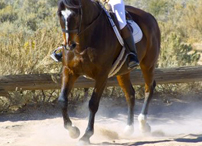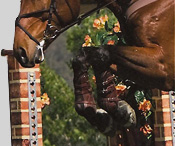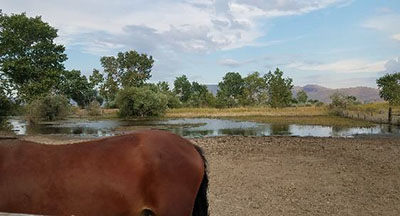



"Building healthy partners"
West Nile Virus


DUE TO OUR UNUSUAL SUMMER
CONDITIONS I AM RECOMMENDING
THAT ALL HORSES RECEIVE A FALL
BOOSTER WEST NILE VACCINATION
THIS YEAR
Last week I was called to see an acutely ill performance horse. I found a shiny, chestnut mare in beautiful condition standing with her head low, unable to walk, profoundly weak in her front end, with muscle tremors throughout her body. Despite our best efforts, within 16 hours she was recumbent and barely responsive. I got on my knees to inject the euthanasia solution that ended her life, as her owner watched in shock. The owner had not vaccinated against West Nile Virus this Spring.
After a long lull, clinical cases of West Nile Virus in horses are suddenly appearing in our area. Positive mosquito populations have been identified from Spanish Springs to Washoe Valley. Unusual amounts of standing water, frequent warm rain showers, and persistent high temperatures all favor heavy mosquito populations thriving into late summer and early fall. This is the highest risk time for West Nile Virus infection as bird migration activity begins while mosquito populations persist.
Three horses in the greater Reno area were confirmed to be ill with West Nile Virus in mid-August. All were not currently vaccinated against the disease. Fatality in unvaccinated horses is 30-40%. Horses with current vaccination status are up to 3x less likely to become ill with West Nile Virus, and there are no reports of death in vaccinated horses.
West Nile Virus is a disease of birds. When a mosquito bites an infected bird it ingests a large viral load with the bird’s blood. If the mosquito’s next meal ticket is a horse, the mosquito can transfer that infectious West Nile Virus to the horse. The horse is considered a “dead end host”. The disease travels from bird to mosquito to horse. It CANNOT be spread from horse to horse, or horse to mosquito, or horse to human, or horse to bird, or horse to anything. Horses just happen to be extremely susceptible to the West Nile Virus disease, and if unvaccinated, are at high risk of developing clinical signs which can be fatal.
Clinical signs of West Nile Virus include depression, abnormal mentation, muscle twitches and tremors, stumbling gait, weakness, and eventually recumbency. Horses that survive West Nile Virus infection usually recover completely. Call your veterinarian immediately if you suspect West Nile Virus Infection, which is a reportable disease monitored by the Nevada State Veterinarian’s Office.
PO BOX 60730
RENO NV 89506
EMERGENCY (775) 742-2823 OFFICE (775) 969-3495
FAX (775) 969-3923




